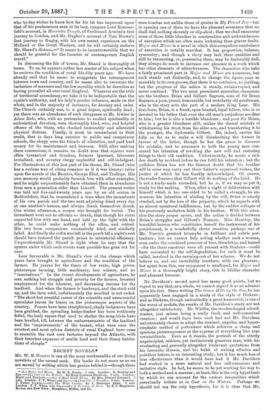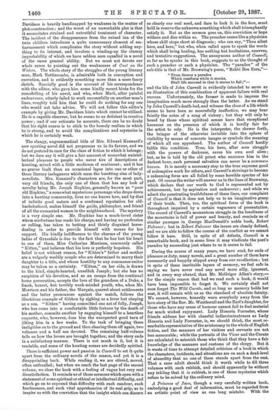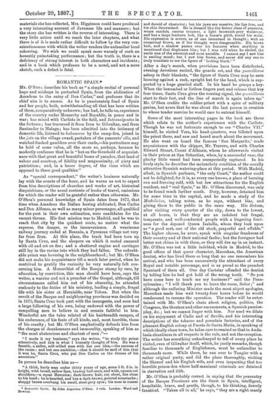RECENT NOVELS.* Ma. W. E. Noanis is one of the
most workmanlike of our living novelists of the second rank. His books do not move us as we are moved by writing which has genius behind it—though there
(1.) Major and Minor. By W. E. Norris. 3 vols. London B. Bentley and 1300.—(2.) Cast on the Waters. By Mugs Coleman Davidson. 3 vols. London Hurst and Blaokett.--13.) A Beal Good Thing. By Mrs. Edward Kennard. 3 vols. London F. V. White and Co.—(4.) Caswell a Paradox. 2 voh. London T. Fisher Ilowin.—(5.) The Wild Citrate. By J. lieGtigor Allan. 3 vols. London : F. V. White and Co.—(6.) A Princess of Jars. By 8. J. Higginson. Boston and New York, Honghton, Idiffilm and Co. were touches not unlike those of genius in My Friend Tins—but in opening one of them we have the pleasant assurance that we shall find nothing slovenly or slip-ehod; that we shall encounter none of those little blunders in construction and awkwardnesses of narration which are often more irritating than graver faults. Major and Minor is a novel in which this scrupulous carefulness of execution is notably manifest. It has proportion, balance, symmetry ; and though a story may lack these qualities and still be interesting, or, possessing them, may be deplorably dal, they always do much to increase our pleasure in a work which has other elements of attractiveness. The characters who take a fairly prominent part in Major and Minor are numerous, but each stands out distinctly, and, to change the figure, runs so smoothly in its own groove, that there is no confusion, no jostling, but the progress of the action is steady, uninterrupted, and never confused. The two most prominent masculine characters are the brothers Brian and Gilbert Segrave, sons of Sir Brian Segrave, spoor, proud, honourable, but crotchetty old gentleman, who in the story acts the part of a modern King Lear. His first-born, Brian, is a frank, open-hearted, loyal fellow, who is so devoted to his father that even the old man's prejudices are dear to him ; but he is also a terrible blunderer ; and poor Sir Brian, who is a greater blunderer still, makes the dismal mistake of withdrawing his trust from his elder son, and transferring it to the younger, the diplomatic Gilbert. He, indeed, carries his folly so far as to make a will disinheriting the former in favour of the latter, though he has the grace to discover his mistake, and to announce to both the young men con- cerned his intention of revoking the new will and restoring things to their old condition. Unfortunately, he meets a sud- den death by accident before he can fulfil his intention ; but the guileless Brian has not the faintest doubt that his brother will in some way carry out their father's expressed wishes, the justice of which he has frankly acknowledged. Of course, the reader foresees that Gilbert will do nothing of the kind. He is not a ready-made scoundrel, but he is, if we may so put it, ready for the making. When, after a night of deliberation with himself which is too one-sided to be called a struggle, he an- nounces his intention of abiding by the will, Brian is utterly crushed, not by the loss of the property, which he regards with an almost unnatural indifference, bat by the sodden collapse of his previously unshaken faith in his brother. With this situa- tion the story proper opens, and the action is divided between Brian's struggles and Gilbert's Nemesis. Miss Huntley, the beautiful heiress who constitutes herself the instrument of his punishment, is a wonderfully clever creation, perhaps one of Mr. Norris's greatest triumphs in brilliant and subtle por- traiture; but we cannot help asking whether such a woman, even under the combined pressure of love, friendship, and hatred —for the three emotions were all present with Beatrice—could have consented to the self-degradation, for such it must be called, involved in the carrying-out of her scheme. We do not believe so, and our incredulity interferes with our pleasure ; but apart from this, our enjoyment is unalloyed, for Major and Minor is a thoroughly bright story, rich in lifelike character and pleasant humour.
Mr. Davidson's second novel has many good points, but we regret to say that, as a whole, we cannot regard it as an advance upon his first. Since writing The Green Hills by the Sea, he has apparently been engaged in a study of the style of Dickens ; and as Dickens, though undoubtedly a great humonrist, is one of the worst of models, the results of Mr. Davidson's study are not altogether satisfactory. Mr. Whiffin, the wooden-legged school- master, just misses being a really fresh and well-conceived creation ; and would have been such had not Mr. Davidson unfortunately chosen to adopt the strained, angular, and hyper. emphatic method of portraiture which achieves a cheap and spurious picturesqueness at the expense of everything like true verisimilitude. Even as it stands, the portrait of the utterly unprincipled, reckless, yet instinctively generous man, with his everlasting and generally altogether irrelevant quotations from his favourite Horace, and his habit of writing effusive and pointless letters, is an interesting study; but it has much less of true effectiveness than it would have had if Mr. Davidson had worked in a more natural and less self-conscious and imitative style. In fact, he seems to be yet working his way to both a method and a manner ; at least, this is the only hypothesis by which we can account for the curious inequalities which perpetually irritate us in Oast on the Waters. Perhaps we should not say the only hypothesis, for it is clear that Mr. Davidson is heavily handicapped by weakness in the matter of plot-construction; and the worst of an unworkable plot is that it necessitates strained and untruthful treatment of character. The incident of the disappearance from the ruined inn of the twin children introduces a quite unnecessary element of em- barrassment which complicates the story without adding any- thing to its interest, and involves a winding-up the clumsy improbability of which we have seldom seen equalled in a novel of the same general ability. But we must not devote our whole space to pointing out the weaknesses of Cast on the Waters. The whole story of the struggles of the young literary man, Mark Battiscombe, is admirable both in conception and execution, and is evidently something more than a mere fancy sketch. Specially good is the account of his correspondence with the editor, who gave him some kindly meant hints for the remodelling of his novel, and who, when Mark, after painful endeavours, utterly failed to work successfully on another man's lines, roughly told him that he could do nothing for any one who would not take advice. We will not follow this editor's example by giving Mr. Davidson hints which cannot be utilised. He is a capable observer, but he seems to us deficient in creative power ; and if our estimate be accurate, there can be no doubt that his right course is to stick to the homely realism in which he is strong, and to avoid the complications and mysteries in which he is certainly weak.
The slangy, ungrammatical title of Mrs. Edward Kennard's new sporting novel did not prepossess us in its favour, and we do not pretend to care for the class of fiction to which it belongs; but we dare say it will give a fair amount of somewhat unintel- lectual pleasure to people who never tire of descriptions of hunting, mixed with a little modicum of sentiment ; and it has no graver fault than an occasional lapse into one or other of those literary inelegances which seem the besetting sins of lady. novelists. Mrs. Kennard's characters are, for the most part, very old friends, the only one of them that has any look of novelty being Mr. Joseph Hopkins, generally known as "poor old Hopkins," a somewhat mysterious personage who drops down into a hunting community, lives no one knows how, and by dint of infinite good nature and a confirmed reputation for old- bachelorhood, makes himself the guide, philosopher, and friend of all the unmarried women in the neighbourhood. The mystery is a very simple one. Mr. Hopkins has a much-loved sister whom misfortune has made his charge, and having no profession or calling, has taken to betting and thinly disguised horse- dealing in order to provide himself with means for her support. His kindly indifference to the charms of the young ladies of Grassdale is due to the fact that he has lost his heart to one of them, Miss Catherine Morrison, commonly called "Kitten," and believes that his love is perfectly hopeless. His belief is not without reason, for "Kitten's" father and mother are a vulgarly worldly couple who are determined to marry their daughter to a title, and whose hostility to any commoner-suitor may be taken as a certainty. "Kitten," on her side, is drawn to the kind, simple-hearted, unselfish Joseph; but she has no suspicion of his devotion, and as an escape from the continual home persecution, accepts the love of the grandson of a Doke, a frank, honest, but terribly weak-minded youth, who, when Mr. Morrison and his father, the Marquis, quarrel about settlements and the latter pronounces against the match, follows the illustrious example of Gibbon by sighing as a lover but obeying as a son. "Kitten" having committed one act of folly, Joseph, who has come into a comfortable little fortune by the death of his mother, commits another by engaging himself to a heartless coquette, who, however, does him the unexpected good turn of jilting him in a few weeks. To the task of bringing these ineligibles onto the ground and then clearing them off again, two volumes and a half are devoted. The remaining half-volume tells us how the lovers are brought together, and the story ends in a satisfactory manner. There is not ranch in it, but it is readable, and some of the hunting scenes are decidedly spirited.
There is sufficient power and passion in Caswell to set it quite apart from the ordinary novels of the season, and yet it is a disappointing bock. While reading it, we are stirred, moved, often enthralled; but when we reach the last page of the second volume, we close the book with a feeling of vague but very real dissatisfaction. It reminds us of those sermons which open with a statement of some spiritual or ethical or intellectual difficulty, and which go on to expound that difficulty with such candour, such fearlessness, and such vital apprehension of its real grip, as to inspire us with the conviction that the insight which can discern ea clearly our real need, and dare to look it in the face, must hold in reserve the unknown something which shall triumphantly satisfy it. But as the sermon goes on, this conviction or hope withers and dies within us. The preacher seems like a physician whose skill stops short at diagnosis ; who can say," Thou vilest here, and here," but who, when called upon to speak the words which shall bring healing, has nothing but hesitations, reserves, and tentative suggestions. The anonymous author of Caswell, so far as he speaks in this book, suggests to us the thought of such a preacher or such a physician. The " paradox " of the sub-title is that of Mr. Browning's poem, "Rabbi Ben Ezra,"—
" From thence a paradox
Which comforts while it mocks, Shall life succeed in that it seems to fail ;"—
and the life of John Caswell is evidently intended to serve as an illustration of this combination of apparent failure with real success. Unfortunately, the former is made to impress the imagination much more strongly than the latter. As we stand by John Caswell's death-bed, and witness the close of a life which seems to have been so mournfully ineffective, we may hear faintly the notes of a song of victory ; but they will only be heard by those whose spiritual senses have that exceptional keenness on the presence of which it is hardly fair for the artist to rely. He is the interpreter, the shewer forth, the bringer of the otherwise invisible into the sphere of visibility by means of concrete images or symbols the meaning of which all can apprehend. The author of Caswell hardly fulfils this condition. True, his hero, after sore struggle with the powers of darkness, saves his own soul alive ; but, as he is told by the old priest who succours him in the darkest hour, such personal salvation can never be a summon bonum. It is merely a necessary step to the tree supreme good of redemptive work for others, and Caswell's strivings to become a redeeming force are all foiled by some horrible spectre of his past. Of course the writer will answer us in the lines of Browning, which declare that our worth to God is represented not by achievement, but by aspiration and endeavour ; and while we admit the penetrating truthfulness of these lines, our complaint of Caswell is that it does not help us to an imaginative grasp of their truth. Then, too, the spiritual force of the book is throughout impaired by a certain vagueness of presentation. The record of Caswell's momentous struggle in the loneliness of the mountains is full of power and beauty, and reminds us of similar passages in George MacDonald's noble book, Robert Falconer ; but in liclert Falconer the issues are clearly defined, and we are able to follow the course of the conflict as we cannot follow it here. Still, in spite of all defeats, Caswell is a remarkable book, and in some lives it may vindicate the poet's paradox by succeeding jest where to us it seems to fail.
During the course of many years, we have read, for ends of pleasure or duty, many novels, and a great number of them have necessarily and happily slipped away from our recollection; but in spite of these inevitable lapses of memory, we feel safe in saying we have never read any novel more silly, ignorant, and in every way absurd, than Mr. McGrigor Allan's story,— or the simple reason that had we read such a book, it would have been impossible to forget it. We certainly shall not soon forget The Wild Curate, and so long as memory holds her seat, it will remain with us as the standard of absolute fatuity. We cannot, however, honestly warn everybody away from the love-story of the Rev. Mr. Weatherall and the Earl's daughter, for those who have any sense of humour cannot fail to find material for much wicked enjoyment. Lady Honoria Forrester, whose friends address her with cheerful indiscriminateness as Lady Houoria and Lady Forrester, is, we should think, the most re- markable representative of the aristocracy in the whole of English fiction, and the manners of her visitors and servants are not lees memorable; while the portraits of the Vicar and the Curate are calculated to astonish those who think that they have a fair knowledge of the manners and customs of the clergy. But it is waste of time to attempt detailed criticism of a book in which the characters, incidents, and situations are on such a dead-level of absurdity that no one of them stands apart from the rest. That a sane adult should think it worth while to fill three volumes with such rubbish, and should apparently be without any inkling that it is rubbish, is one of those mysteries which refuse to be solved by the ordinary mind.
A Princess of Java, though a very carefully written book, embodying a good deal of information, must be regarded from an artistic point of view as one long mistake. With the materials she has collected, Mrs. Higginson could have produced a very interesting account of Javanese life and manners ; but the story she has written is the reverse of interesting. There is very little action until we reach the later chapters, and what there is of it is made rather difficult to follow by the very con- scientiousness with which the writer renders the unfamiliar local colouring. We wish we could speak more warmly of such an honestly painstaking performance; but the truth is, there is a deficiency of strong interest in both characters and incidents ; and in a book which professes to be a novel, and not a mere sketch, such a defect is fatal.




































 Previous page
Previous page